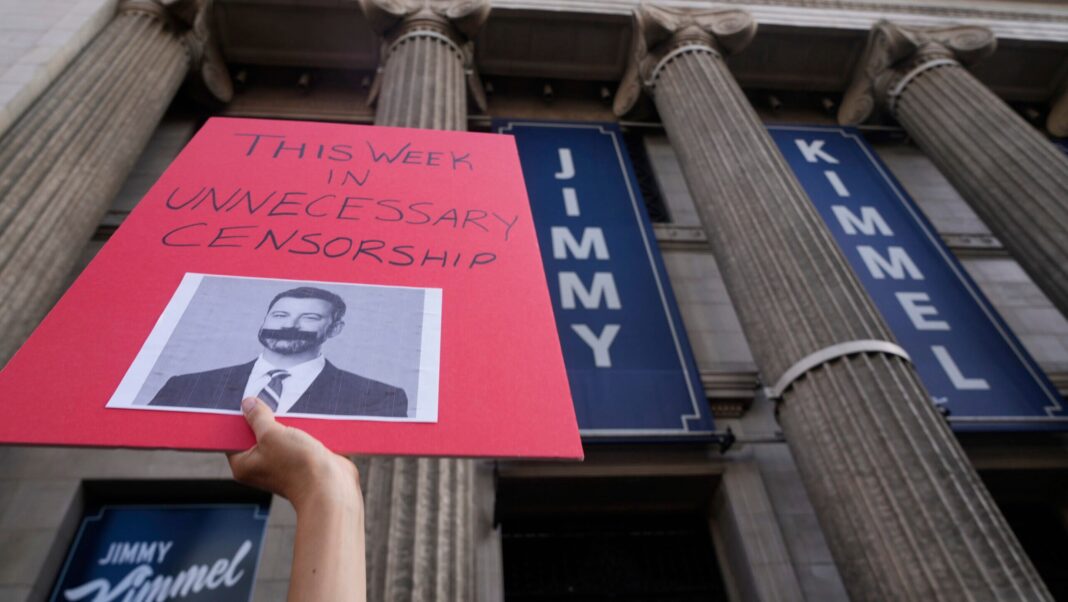Late-Night Solidarity: Comedians Rally for Jimmy Kimmel
On a recent Thursday night, the landscape of late-night television took an unexpected turn as Jon Stewart, Stephen Colbert, and Jimmy Fallon each kicked off their shows with a mix of humor, empathy, and criticism in response to the suspension of ABC host Jimmy Kimmel. The outpouring of support from his fellow late-night hosts highlighted not only their camaraderie but also raised vital questions about freedom of speech and censorship in media.
The Catalyst: Kimmel’s Suspension
Kimmel’s indefinite suspension from “Jimmy Kimmel Live!” came after his controversial comments regarding the assassination of conservative activist Charlie Kirk. These comments prompted backlash, leading to criticism from groups and media executives alike. In a notable response, Federal Communications Commission Chairman Brendan Carr asserted that there was a strong case for accountability due to perceived misinformation stemming from Kimmel’s remarks. This situation set the stage for a unique evening of late-night commentary.
Stewart Takes a Satirical Jab
Jon Stewart, known for his sharp wit and satirical insights, opened his segment by mocking the very notion of compliance expected from comedians. With a playful tone, he introduced his show by vowing to adhere to the “party line.” His commentary swiftly moved into a critique of President Donald Trump’s rhetoric, particularly about urban crime.
The set of “The Daily Show” had an unmistakable Trump-inspired aesthetic, which Stewart cleverly twisted for comedic effect. He feigned concern about his own script, humorously worrying about the audience’s reception. He even referred to Trump in a mocking glorification, calling him “our great father” and painting a ludicrously regal picture of the president, illustrating both his absurdities and the weight of the current political climate.
Colbert’s Serious Take on Censorship
In contrast to Stewart’s satirical approach, Stephen Colbert adopted a more earnest tone during his monologue. He directly addressed Kimmel’s situation, labeling the suspension as “blatant censorship.” Colbert’s audience response was passionate as he articulated the importance of freedom of speech. He reassured Kimmel that he stood in solidarity with him and his team, signaling that the ramifications of censorship extend far beyond individual shows.
Colbert went a step further by invoking the influence of governmental pressures on media, emphasizing that such actions bring us closer to a managed media environment. During his discussion with New Yorker editor David Remnick, he articulated a somber reality: media outlets acting under the thumb of political power can compromise journalistic integrity and free expression.
Fallon’s Tributes and Unfiltered Humor
Jimmy Fallon, presenting his trademark charm, offered heartfelt support for Kimmel. In a candid monologue, Fallon expressed uncertainty about the situation but emphasized Kimmel’s character, stating, “He’s a decent, funny, and loving guy.” Unlike Stewart and Colbert, Fallon’s guest lineup—featuring actor Jude Law, journalist Tom Llamas, and singer Jonathan Groff—did not engage directly with Kimmel’s predicament, yet Fallon’s affectionate tribute echoed the sentiments of his fellow comedians.
Adding a humorous twist, an announcer cheekily interrupted Fallon, replacing critiques of Trump with exaggerated flattery. This moment encapsulated the absurdity of navigating comedy in a polarized political climate, where humor must sometimes yield to the pressures of public perception.
Censorship Conversations with Maria Ressa
In an insightful segment following Stewart’s monologue, he interviewed Maria Ressa, a journalist and Nobel Peace Prize recipient, about her experiences with governmental censorship in the Philippines under President Rodrigo Duterte. Ressa’s resilience resonated as she articulated the mantra of continuing the work despite adversity: “We just kept putting one foot in front of the other.” Her insights provided a compelling narrative about journalistic fortitude and the responsibility of media in the face of oppression.
Reflections from Late-Night’s Past and Present
The evening was not just a platform for current hosts but also sparked reflections from former late-night stars. David Letterman expressed his dismay at the changing landscape of media, critiquing the concept of “managed media” and lamenting that individuals should not face job loss for their non-conformity. His comments underscored the historical challenges present in comedy and commentary, revealing the stakes involved when freedom of speech is compromised.
A Collective Response to Unfolding Challenges
As the night unfolded, the heartfelt responses from Stewart, Colbert, and Fallon illustrated a broader narrative within late-night comedy: the balance of humor and advocacy. In a time when political tensions often spill into media, the unity displayed by these hosts demonstrated the critical role that comedians play in addressing serious issues, while entertaining and informing audiences. Each host provided a unique lens—ranging from sharp satire to earnest advocacy—revealing the complex interplay of comedy and political discourse in America today.



